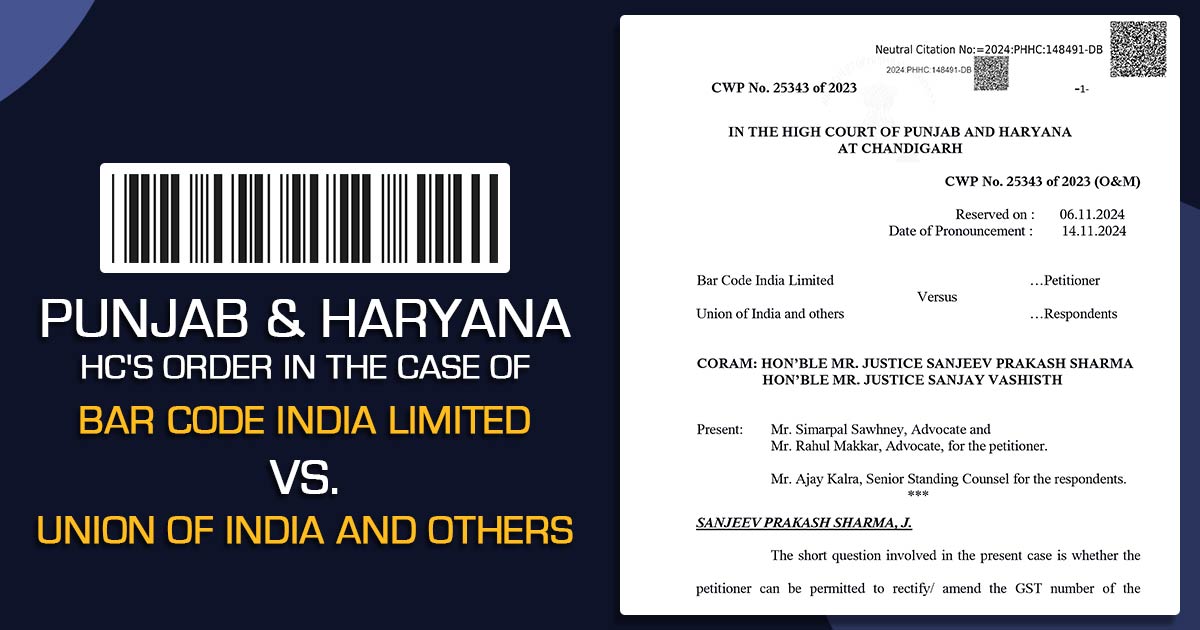
In the case of Bar Code India Limited vs Union of India, the Punjab & Haryana High Court ruled that corrections to a purchaser’s GST number in the GSTR-1 return cannot be made after the limitation period has expired. The court emphasized that errors by a company, causing financial loss to another, do not initiate an interpretation of the law to allow such mistakes.
Bar Code India Limited, the petitioner, issued invoices to the purchaser during the financial year 2021–2022. However, the petitioner company made errors in its GSTR-1 filing by incorrectly identifying the point of sale as Mumbai instead of Delhi and using the GST number of the purchaser in Mumbai instead of in Delhi.
The petitioner claimed they became aware of the errors in April 2023 when the purchaser informed them about difficulties in claiming input tax credit.
As a result, the purchaser denied the payments for other invoices. In response, the petitioner wrote to the department on August 18, 2023, requesting permission to amend their GSTR-1 for three invoices dated May 13, 2021. However, the department denied the request, citing the absence of a provision to amend returns after the prescribed deadline.
The court explained that the GST filing process involves a matching mechanism detailed in Sections 37 and 38 of the GST Act, after which it will generate Form GSTR-3 for returns submission. After it is submitted, any rectifications may have long-term impacts.
T Errors or omissions can only be corrected during the initial stages of filing GSTR-1 or GSTR-3, as subsequent changes could attract long-term hurdles on the system. The exemption given particularly for GSTR-3 is different than the one given in pre-GST stages. And it does not have the law to auto-fill data and entries.
Once a supplier files GSTR-1 with details of invoices (place of sale and the GSTR number), the system auto-generates GSTR-2A for the recipient, which forms the criteria for claiming input tax credit in GSTR-3B.
As per Section 16(4) of the GST Act, a GST-registered person cannot claim input tax credit beyond the due date for filing the return under Section 39 for September following the end of the relevant financial year for which these invoices or debit notes are relevant to for the annual return, whichever comes earlier.
The division bench, comprising Justice Sanjeev Prakash Sharma and Justice Sanjay Vashisth, noted that even if the petitioner is permitted to amend the return, it would not automatically enable the purchaser to claim the input tax credit.
The court observed that if the error had been identified before the filing of the annual return, it could have been corrected in GSTR-1 for the relevant month. The portal allows such corrections only until the annual return is filed.
The court also held that businesses are expected to be well-versed with legal provisions, including the given deadlines. It rejected the argument that the law should be adjusted to accommodate errors by businesses, especially since both companies involved have been operating for a considerable time.
The writ petition was dismissed because it lacked merit. The court reiterated that the provisions of the GST Act cannot be altered to benefit a company due to its own mistakes.
| Case Title | Bar Code India Limited vs. Union of India and Others |
| Citation | CWP No. 25343 of 2023 (O&M) |
| Date | 14.11.2024 |
| Petitioner By | Mr. Simarpal Sawhney, Mr. Rahul Makkar |
| Respondents By | Mr. Ajay Kalra |
| Punjab and Haryana High Court | Read Order |









